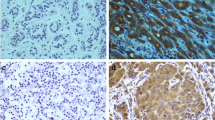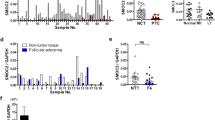Abstract
Background
Valosin-containing protein (VCP) is involved in the ubiquitin/proteasome-degradation pathway, which works in proliferation and antiapoptosis in human cancer cells. Our previous study showed that VCP expression levels correlated with the recurrence and prognosis of several human cancers, such as hepatocellular carcinoma, gastric carcinoma, and colorectal carcinoma. In this study, the correlation of VCP expression with the prognosis of differentiated thyroid carcinoma was examined.
Methods
VCP expression in 332 patients who underwent operation for differentiated thyroid carcinoma—257 with papillary thyroid carcinoma and 75 with follicular thyroid carcinoma (FTC)—was analyzed by immunohistochemistry. The staining intensity in tumor cells was categorized as weaker than (low expression), equal to (intermediate expression), or stronger than (high expression) that in endothelial cells in noncancerous tissue.
Results
One hundred ten (33.5%) cases showed low VCP expression, 117 (28.0%) showed intermediate expression, and 101 (30.8%) showed high expression. VCP expression significantly correlated with histological subtype (P < .05) and lymph node metastasis (P < .01). However, it correlated with neither any clinicopathologic factor nor prognosis in papillary thyroid carcinoma. VCP expression correlated with extrathyroidal extension (P < .05), pT classification (P < .05), and lymph node metastasis (P < .01) in FTC. Patients with low VCP expressing FTC showed better disease-free and overall survival rates than those with intermediate or high expression (P < .01 and P < .05, respectively). Multivariate analysis revealed VCP expression and extracapsular extension to be independent prognostic factors for disease-free survival in cases of FTC.
Conclusions
The prognostic utility of VCP expression in FTC was demonstrated.


Similar content being viewed by others
References
Greenlee RT, Hill-Harmon MB, Murray T, Thun M. Cancer statistics, 2001. CA Cancer J Clin 2001;51:15–36
LiVolsi VA. Surgical Pathology of the Thyroid. Philadelphia: Saunders, 1990
Mazzaferri EL. An overview of the management of papillary and follicular thyroid carcinoma. Thyroid 1999;9:421–7
Bellantone R, Lombardi CP, Boscherini M, et al. Prognostic factors in differentiated thyroid carcinoma: a multivariate analysis of 234 consecutive patients. J Surg Oncol 1998;68:237–41
Noguchi M, Yagi H, Earashi M, Kinoshita K, Miyazaki I, Mizukami Y. Recurrence and mortality in patients with differentiated thyroid carcinoma. Int Surg 1995;80:162–6
Asai T, Tomita Y, Nakatsuka S, et al. VCP (p97) regulates NFkappaB signaling pathway, which is important for metastasis of osteosarcoma cell line. Jpn J Cancer Res 2002;93:296–304
Dai RM, Li CC. Valosin-containing protein is a multi-ubiquitin chain-targeting factor required in ubiquitin-proteasome degradation. Nat Cell Biol 2001;3:740–4
Yamamoto S, Tomita Y, Nakamori S, et al. Elevated expression of valosin-containing protein (p97) in hepatocellular carcinoma is correlated with increased incidence of tumor recurrence. J Clin Oncol 2003;21:447–52
Yamamoto S, Tomita Y, Hoshida Y, et al. Expression level of valosin-containing protein is strongly associated with progression and prognosis of gastric carcinoma. J Clin Oncol 2003;21:2537–44
Tsujimoto Y, Tomita Y, Hoshida Y, et al. Elevated expression of valosin-containing protein (p97) is associated with poor prognosis of prostate cancer. Clin Cancer Res 2004;10:3007–12
Yamamoto S, Tomita Y, Hoshida Y, et al. Expression of valosin-containing protein in colorectal carcinomas as a predictor for disease recurrence and prognosis. Clin Cancer Res 2004;10:651–7
Yamamoto S, Tomita Y, Hoshida Y, et al. Increased expression of valosin-containing protein (p97) is associated with lymph node metastasis and prognosis of pancreatic ductal adenocarcinoma. Ann Surg Oncol 2004;11:165–72
Yamamoto S, Tomita Y, Hoshida Y, et al. Expression level of valosin-containing protein (p97) is correlated with progression and prognosis of nonsmall cell lung carcinoma. Ann Surg Oncol 2004;11:697–704
Sobin LH, Wittekind CH. TNM Classification of Malignant Tumours. 6th ed. New York: Wiley-Liss, 2002
Cox DR. Regression models and life tables. J R Stat Soc B 1972;34:197–220
Kaplan E, Meier P. Nonparametric estimation from incomplete observations. J Am Stat Assoc 1958;53:457–81
Muller JM, Meyer HH, Ruhrberg C, Stamp GW, Warren G, Shima DT. The mouse p97 (CDC48) gene. Genomic structure, definition of transcriptional regulatory sequences, gene expression, and characterization of a pseudogene. J Biol Chem 1999;274:10154–62
Chow SM, Law SC, Mendenhall WM, et al. Follicular thyroid carcinoma: prognostic factors and the role of radioiodine. Cancer 2002;95:488–98
Chow SM, Law SC, Au SK, et al. Differentiated thyroid carcinoma: comparison between papillary and follicular carcinoma in a single institute. Head Neck 2002;24:670–7
Akslen LA, LiVolsi VA. Prognostic significance of histologic grading compared with subclassification of papillary thyroid carcinoma. Cancer 2000;88:1902–8
Dou QP, Smith DM, Daniel KG, Kazi A. Interruption of tumor cell cycle progression through proteasome inhibition: implications for cancer therapy. Prog Cell Cycle Res 2003;5:441–6
Yang Y, Yu X. Regulation of apoptosis: the ubiquitous way. FASEB J 2003;17:790–9
Acknowledgments
The authors thank Shinji Morita (Kuma Hospital) for technical assistance.
Author information
Authors and Affiliations
Corresponding author
Rights and permissions
About this article
Cite this article
Yamamoto, S., Tomita, Y., Uruno, T. et al. Increased Expression of Valosin-Containing Protein (p97) Is Correlated With Disease Recurrence in Follicular Thyroid Cancer. Ann Surg Oncol 12, 925–934 (2005). https://doi.org/10.1245/ASO.2005.07.002
Received:
Accepted:
Published:
Issue Date:
DOI: https://doi.org/10.1245/ASO.2005.07.002




